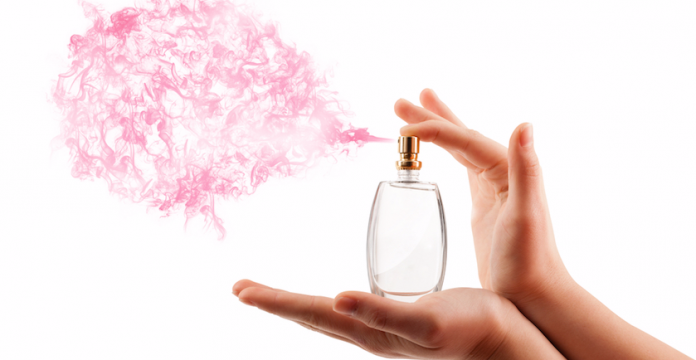
We all like to smell good. In fact, there’s a multi-billion dollar industry dedicated to ensuring that we do. We can smell like line-dried sheets, spring flowers, or mountain streams if we so choose, but maybe there’s a reason we don’t naturally smell like any of them. And maybe we’re not meant to, at least not in the chemically-drenched way it’s being done today.
Seven days a week, most people douse their bodies in synthetic fragrances and perfumes. And we’re not just talking about an occasional spritz of perfume or cologne. We’re talking daily, multiple exposures to toxic chemical compounds that make up the synthetic fragrances found in just about every product imaginable, including cosmetics, personal care products, household cleaners, air fresheners, deodorizers, laundry detergents, dryer sheets and so on. While they may smell nice, their effects are anything but. Here’s why I think everyone should step out from under the fragrance cloud.
1. Fragrances Don’t Stay on the Surface – They Go Deep
When you lather-up or spray down your body and home with scented products, your body absorbs many of the chemicals through the skin, nose, and mouth. Though it might not seem like a big deal, keep in mind, each chemical you inadvertently ingest has an effect on the body and it’s rarely good. Your body then has to work hard to filter out as many of the toxins as it can, but some are tough to eliminate, while others can hang around for the long-haul. Either way, all those toxins building up over time can trigger trouble.
2. A Rose by Any Other Name…
These days, the word “fragrance” is essentially a euphemism for the nearly 4,000 or so different chemical ingredients that can wind up in your scented products. Most “fragrances” are synthetic, petroleum-based and synthetic fragrances are toxic to our bodies, capable of triggering skin problems, allergies, respiratory difficulties, hormonal, metabolic and thyroid problems, even certain cancers and neurological damage. Simply put, we know that exposure to the chemicals in fragrances and scented products undermine health. Furthermore, there are those who theorize that long-term exposure to some of these chemicals may also be connected to the development of brain disorders like Alzheimer’s and Parkinson’s, though the link has not been pinned down just yet. In the meantime though, my advice is, better safe than sorry, so quit spritzing and give scented products the boot.
Read more about Alzheimer's and pesticides
3. Fragrances Are Mysterious Chemical Cocktails
Identifying individual chemicals that make up a particular fragrance is, unfortunately, virtually impossible for consumers. Why? Because manufacturers aren’t required to list every ingredient in their proprietary fragrance brews. Instead of being called out on the label, questionable ingredients get to hide behind the word “fragrance.” So as far as the maker is concerned, it’s all good. Like the catch-all phrase, “natural flavors” that often appears on processed food labels, “fragrance” is used to similar effect, keeping corporate secrets safe and consumers at risk. And that just stinks.
4. Think of Fragrance as a Toxic Layer Cake
According to consumer advocates the Environmental Working Group, over the course of the average day, women are exposed to more than 160 chemicals just from their cosmetics alone. Add to that, a few shower products, hair products, cleaning products and a load of laundry or two, and the amount of daily chemical exposure climbs even higher. The EWG also reported that tests of fragrance ingredients have found an average of 14 hidden compounds per formulation, including ones linked to hormone disruption and sperm damage. Multiply every scented product you use daily by a factor of 14, all that voluntary exposure to toxins starts to look like sheer madness.
Read more about dangerous chemicals in clothing
BE WELL BONUS:
All this doesn’t mean however that you have to spend the rest of your days completely scent-free, just enjoy ‘em in a smarter, healthier way. Steer clear of synthetic fragrances and consider the following simple scent-sible adjustments:
- Buy the greenest, unscented cosmetics, personal care products, household cleaners, fabric softeners you can find.
- If you’re particularly addicted to a scented product and simply refuse to give it up, then cut usage back by half or a third or water it down. Another option: alternate between a clean, green, unscented product and your scented favorite. It’s all about reducing exposure, and the more of it you do the better.
- Get to know the bad guy toxins by name and reputation by referring to the EWG’s Consumer Guides and purchasing accordingly.
- Try making your own scents from essential oils. They’re made from truly natural ingredients like flowers, leaves, grasses and so on, and are kinder to your body, home and planet. And remember – don’t fooled though by bottles marked fragrance oils as they are almost always made of must-to-avoid synthetic ingredients.
This article originally appeared on DrFrankLipman.com.
Image: Felipe Ernest




